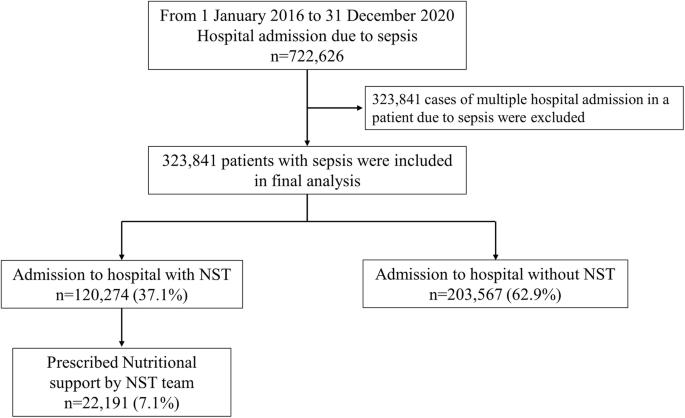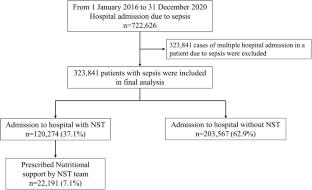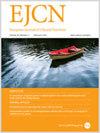Multidisciplinary nutritional support team and survival outcomes in patients with sepsis: a nationwide population-based cohort study in South Korea
IF 3.6
3区 医学
Q2 NUTRITION & DIETETICS
引用次数: 0
Abstract
The South Korean government implemented a multidisciplinary nutritional support team (NST) system to focus on the proper evaluation and supply of nutritional status in hospitalized patients who are at a higher risk of malnutrition. This nationwide population-based cohort study included patients diagnosed with sepsis who were admitted to hospitals from 2016 to 2020. The NST should consist of four professional personnel (physicians, full-time nurses, full-time pharmacists, and full-time clinical dietitians). The NST group included patients with sepsis admitted to a hospital with an NST system, whereas the non-NST group included patients with sepsis admitted to a hospital without an NST system. A total of 323,841 patients with sepsis were included in the final analysis, and 120,274 (37.1%) admitted to a hospital with an NST system were included in the NST group. In the multivariable Cox regression analysis, the NST group showed a 15% lower 90-day mortality than the non-NST group (hazard ratio [HR]:0.85, 95% confidence interval [CI]:0.83, 0.86; P < 0.001). The NST group shows 11% lower 1-year all-cause mortality than the non-NST group (HR:0.89, 95% CI:0.87, 0.90; P < 0.001). In subgroup analyses, a more evident association of the NST group with lower 90-day mortality was shown in the intensive care unit admission group and age ≥65 years old group. Multidisciplinary NST intervention is associated with improved survival outcomes in patients with sepsis. Moreover, this association was more evident in patients with sepsis aged ≥65 years old who were admitted to the ICU.


多学科营养支持团队与脓毒症患者的生存预后:韩国一项基于全国人口的队列研究。
背景韩国政府实施了多学科营养支持团队(NST)制度,重点关注营养不良风险较高的住院患者营养状况的正确评估和供应:这项基于人群的全国性队列研究纳入了 2016 年至 2020 年期间入院的确诊为败血症的患者。NST 应由四名专业人员(医生、专职护士、专职药剂师和专职临床营养师)组成。NST组包括有NST系统的医院收治的败血症患者,而非NST组包括没有NST系统的医院收治的败血症患者:共有 323,841 名脓毒症患者被纳入最终分析,其中 120,274 名(37.1%)在配有 NST 系统的医院住院的患者被纳入 NST 组。在多变量考克斯回归分析中,NST组的90天死亡率比非NST组低15%(危险比[HR]:0.85,95%置信区间[CI]:0.83,0.86;P 结论:多学科 NST 干预与脓毒症患者生存率的改善有关。此外,这种关联在年龄≥65 岁、入住重症监护室的脓毒症患者中更为明显。
本文章由计算机程序翻译,如有差异,请以英文原文为准。
求助全文
约1分钟内获得全文
求助全文
来源期刊
CiteScore
10.60
自引率
2.10%
发文量
189
审稿时长
3-6 weeks
期刊介绍:
The European Journal of Clinical Nutrition (EJCN) is an international, peer-reviewed journal covering all aspects of human and clinical nutrition. The journal welcomes original research, reviews, case reports and brief communications based on clinical, metabolic and epidemiological studies that describe methodologies, mechanisms, associations and benefits of nutritional interventions for clinical disease and health promotion.
Topics of interest include but are not limited to:
Nutrition and Health (including climate and ecological aspects)
Metabolism & Metabolomics
Genomics and personalized strategies in nutrition
Nutrition during the early life cycle
Health issues and nutrition in the elderly
Phenotyping in clinical nutrition
Nutrition in acute and chronic diseases
The double burden of ''malnutrition'': Under-nutrition and Obesity
Prevention of Non Communicable Diseases (NCD)

 求助内容:
求助内容: 应助结果提醒方式:
应助结果提醒方式:


